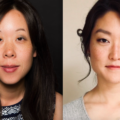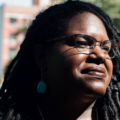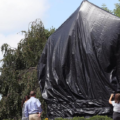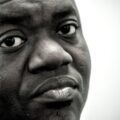Literature is not an Object: Toward an inter-“Activism”

“Leap and dance, ye living buildings—”
—Shaker hymn
I’m not writing this, and you’re not reading it. Because, how am I going to describe it, the beloved unspeakability, especially of what happens when I’m a “we’re.” It’s a hard place, a difficulty. Not to know anything, just recipes that didn’t work, ingredients that made a difference. Do I un-hashtag myself? Very well, I un-hashtag myself; I am large, I contain un-coalesced-multitudes.
“I thought of [both art and protest] as literature and still do.”
—James Baldwin“The challenge that we both have is that in a way, economy, as the master philosophy, has won…. The highest and best use for a building is usually the highest rent you can get. It has nothing to do with … what neighborhoods need…. I feel I’ve never left clay. If I think about clay more abstractly, the vessel makes space. It defines space, and then once that space is made, things can happen … that’s why … I understand what makes a thriving neighborhood or a thriving city … is a more complicated mix of things….”
—Theaster Gates
Ask most people about the word “nonviolence” and they will see an image of a lunch counter, or protest signs. Ask most people about the word “activism” and they’ll see marches, leaflets, knocking on doors, people testifying at hearings, or sitting-in. How those actions are like the lip of a wave, which people want to watch—but from a distance. Because who has the strength, to try to push something from an ocean floor, a hundred miles away.
What if whatever that word “activism” points to was not only about protest, not only about sainthood or heroism. Was as natural to each of us as reaching for our pillow in the middle of the night. That’s not to say it has to be small-scale. For some of us, that most natural expression might be leading a citywide, multi-level collaboration. For others of us, caring for our loved ones and friends. So that, the opposite wouldn’t be “inactivism.” In fact, maybe there wouldn’t be an opposite, only a more visible spectrum. Just like there isn’t an opposite to art.
“Teach people how … to make an act.”
—Ai Weiwei
When we fight an illness we don’t just aim the medicine at the illness; we strengthen the body, free it from all other obstacles. I don’t want to give too much time to talking about white supremacy; it already takes so much of our life force. Even those of us who benefit from it are affected, though in profoundly different ways. It erodes and elides what else we are. White antiracist imaginaries are largely predicated on what we are not, as in, anymore. But not what else we are, or could be. For those of us raised to believe we are white, we can get caught, not caring for the garden of our deeper thinking, awareness, action, just focused on medicine, the illness of white supremacy, the pill. But then, even as we are convinced (a dangerous thing) of the correctness of what we are doing, we become a string, tightened between “racism,” and its alter-ego, “anti-racism.” And who, or what, plays that larger instrument?
Don’t throw that out; all the vitamins are in the skin (the peel), my grandmother used to say. All the learning is in the details. Appreciate your gifts, she’d say. It’s not like they’re only for you.
The New York Times review of the film Detroit is a great example of this narrowness. The filmmaker, a white woman, is described (by a white journalist) as using her white privilege to speak out against power, because she’s made a film supposedly lifting up black resistance. But she is still credited (and functioning) as the auteur. If there’s an Oscar, it will go to her. The film’s script/screenwriting too: white people. Can white people collaborate with folks of color? Of course. But since the nature of power relations is that members of the subordinate group will, by necessity, hide much of their critiques, the true nature of the collaboration—whether it’s actually authentic, equitable, etc.—is often missed by white people, unless we’ve self-educated, and seen and found our own pathways out of these predictable roles. This won’t happen if white people only focus on interpersonal microaggressions, for instance. As if activism were therapy. We’re still reading from the same script, again and again. We’re still the play-within-the-play.
To rebel is not so much about disowning privilege, but about behaving in such a way that privilege needs to disown me. It’s asking whether work by white people, or white institutions, always has to be acknowledged?
At the heart of whiteness is the urge to possess, control, and display. White people and institutional leaders publicize their relationships with people “in the community” (already a code), often giving legitimate credit and praise, yes, but also raising their own social capital in the process, too. Because part of the absurdity of white supremacy that even ardent “anti-racism” can be used to reinforce white supremacy.
“You do not have to be good.”
—Mary Oliver
You do not have to walk a picket line, you do not have to dial your congressperson, you do not have to talk forever with friends, you do not have to feel at-one with a group of strangers, you do not have to let the fear and worry electrify your imagination, you do not have to watch a neighbor’s rose bush slow blossom, you do not have to quote Dr. King or Toni Morrison or James Baldwin, you do not have to consider leaving, staying, all the things you don’t like, never liked, are not really about, you do not have to renew reuse recycle, you do not have to rent a public bicycle, you do not have to stay with the same political party, you do not have to do what your father did mother did cousin, you do not have to miss the meeting march phoneathon stream clean-up happy hour neighborhood watch neighborhood council, you do not have to take your time walking there because your shoes are worn out, you do not have to choose one person one and only to give your heart to, you do not have to tell all your friends your coworkers your social media contacts about every event you do show up at, you do not have to notice the reflective light of a slug’s path, feel your heart pound when approaching a stranger, you do not have to wear bumper stickers T-shirts team colors, you do not have to put it in your bio your tombstone your intro your outtro your diapers your mindspace.
You could walk a picket line, you could dial your congressperson, you could talk forever with friends, you could feel at-one with a group of strangers, you could let the fear and worry electrify your imagination, you could watch a neighbor’s rose bush slow blossom, you could quote Dr. King or Toni Morrison or James Baldwin, you could consider leaving, staying, all the things you don’t like, never liked, are not really about, you could renew reuse recycle, you could rent a public bicycle, you could stay with the same political party, you could do what your father did mother did cousin, you could miss the meeting march phoneathon stream clean-up happy hour neighborhood watch neighborhood council, you could take your time walking there because your shoes are worn out, you could choose one person one and only to give your heart to, you could tell all your friends your coworkers your social media contacts about every event you do show up at, you could notice the reflective light of a slug’s path, feel your heart pound when approaching a stranger, you could wear bumper stickers T-shirts team colors, you could put it in your bio your tombstone your intro your outtro your diapers your mindspace.
When literature stops being a social form, I wonder what it becomes. Even if it’s a poem unspooling in my mind as I read translations, words written by someone a thousand years ago, on the other side of the planet, to me it seems innately social. The literary will spark, from body to body, across space and time.
Can we even imagine what it will look like to have people’s needs actually met? And, not just what it will look like, but sound like, feel like, in our everybodies.
“There was no leader, there was no person who set the date who said, ‘On this date, people will leave the South.’ They left on their own accord for as many reasons as there are people who left. They made a choice…”
—Isabel Wilkerson
A little thing I tell myself, when I get scared: If you want justice, seek wisdom. If you want wisdom, look for what it is you are unwilling to give up.
Many people call such a broad range of work “social practice.” While that’s accurate, the name “poet” encompasses any needed form. As Jane Hirshfield said to me once, “poetry is ravenous and hybrid.” Hopefully it’s also clear that, for exactly that reason, none of what I’m saying is intended as “should.” I’m aiming for description: a broader spectrum of what Jessica Johnson calls, “infinite literacies.”
I am not making a theological argument, or even a political one, I would say. I am just the friend who points, or swats, at the mosquito on your arm, says, “hey—”.
There is no theatre without spectators. Sometimes, yes, bum rush the stage. But sometimes not a bum rush, sometimes a gentle touch, or not even a touch, a filling of the eyes and heart, a listening-for. And then not offering your arm, when the arm is expected, for help with a graceful exit. Or, offering a nonverbal affirmation, a touch on the arm, even an out-to-coffee invitation to someone you’ve seen reading the “wrong” lines onstage, and causing the “play” to go haywire. Letting them know the Life they’re losing around them has filled your lungs.
To open up space in such overdetermined geographies requires cutting the strings to these overdetermining forces while at the same time holding them in our hands. What Tania Bruguera calls “to be only in between.” Be willing not only to disrupt the space, but to disrupt our selves. Even and especially when we must cross into a not-knowing that is alien to us because it’s so different from our fluorescent-bulb-lit ideas about, for instance, “activism.” Paths back and forth, between that fluorescence, the eyes-adjusting experience of real discovery, like walking at night to no light but the moon.
When I left my marriage, so many of my married friends approached me privately with their pain and fear. I’d say, you know you’re talking to your divorced friend right. I don’t have any medicine. Only I still believe in love and commitment. But love is not the answer.
Love is the reason.
“A political art, let it be/ tenderness…”
—Amiri Baraka
“Integrity” is a word that makes me want to cross the street when I hear it. The words feels like it’s getting ready to raise its voice. Although it’s often used in a moral sense, it is actually related etymologically to words that are more about engineering. We might say that a building has structural integrity. Or a bridge. Or a house. And we live in a crooked house.
I often hear people say “violence,” when they mean “force.” I often hear people say “nonviolence,” when they mean “submissive.” I rarely see people understand that the health of any community can be seen in how well and willingly it protects troublemakers, not just those who dissent, but who do so in ways that the status quo does not like. We call them “angry.” And what is that cordon sanitaire protecting, anyway?
About Ailish Hopper
Poet Ailish Hopper is the author of Bird in the Head (Center for Book Arts), and Dark~Sky Society (New Issues), as well as several essays, most recently in Boston Review. Individual poems have appeared in APR, Harvard Review, and POETRY, as well as many other places. A recipient of support from the MacDowell Colony and Yaddo, she teaches at Goucher College and lives in Baltimore.





